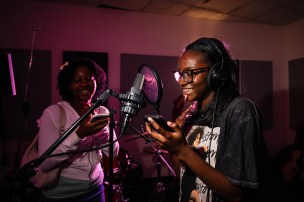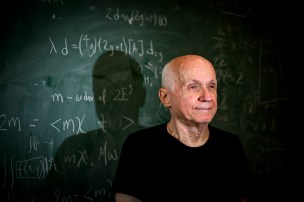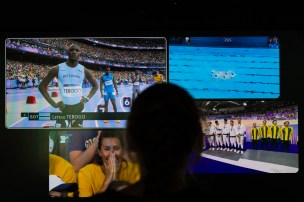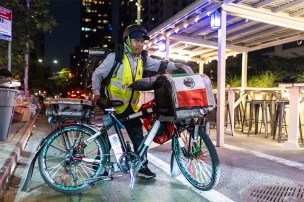Published on
Former Northeastern track athletes move on to next phase as marathoners competing at US Olympic Trials
Michael Duggan and Cameron Dickson shared a common denominator in Matt Lonergan, a Northeastern coach who helped them train for their new event.
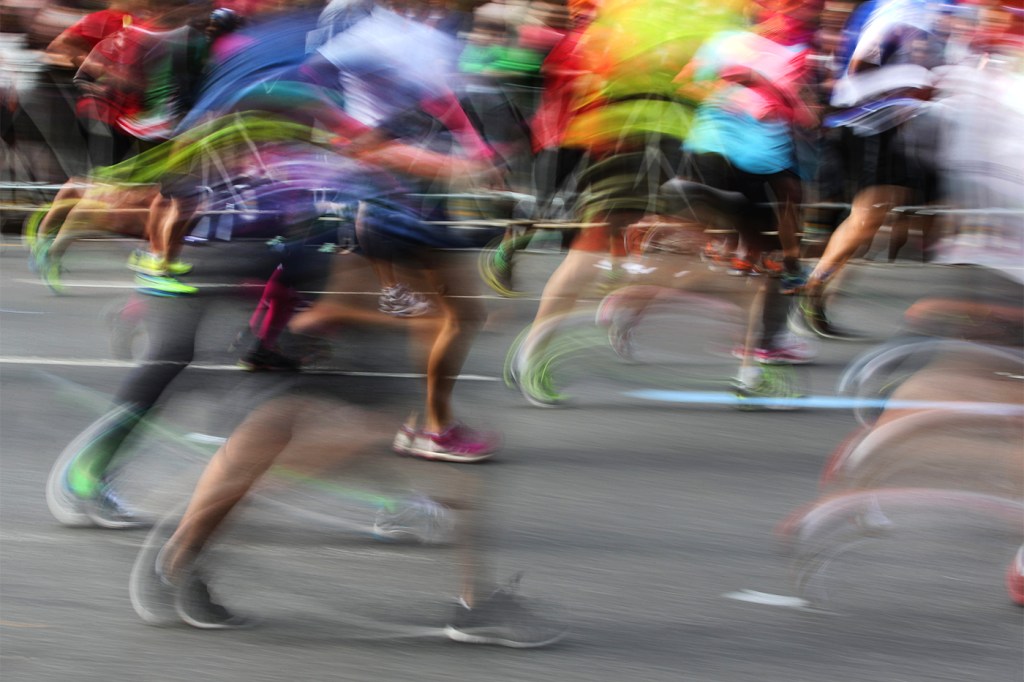
Less than five years after they ran as teammates for Northeastern, Cameron Dickson and Michael Duggan fulfilled a goal that seemed beyond their reach.
On the first Saturday morning in February, the two former Huskies lined up alongside the top American marathoners for the men’s U.S. Olympic Team Trials.
The top three finishers would earn a place at the Olympic Games this summer in Paris.
“It’s pretty obvious to me that I’m not actually going to make the Olympic team,” Duggan said before the event in Orlando — the biggest race of his young marathoning career. “So I think of this as a pinnacle for me personally. I really just want to enjoy it. I want to go in and experience what it’s like to run with the 200-something best guys.”
Their achievement comes into focus when Duggan and Dickson compare marathoning to other sports. Think of an amateur golfer — someone who never contended for an NCAA title — rising quickly to rank among the top 200. Imagine the same achievement in tennis or skiing or snowboarding or figure skating or any other individual event.
In that context, earning a place among the 200 elite runners who competed at the U.S. Trials was a breathtaking achievement. Especially when the longest race Dickson and Duggan ran for Northeastern was 10 kilometers, which is less than one-fourth the distance of a 26.2-mile marathon.
Duggan, having struggled to find his niche with the Huskies track team before graduating in 2020, had competed in just eight marathons when he qualified for the trials.
The ascent for Dickson, who dealt with injuries for much of his college career, was even faster: He qualified in his first and only marathon.
“It’s been something that I’ve had in my mind since around the time of graduating,” Dickson said of his goal of competing in the U.S. Trials. “But I’ve tried to not keep it in the forefront of my mind.”
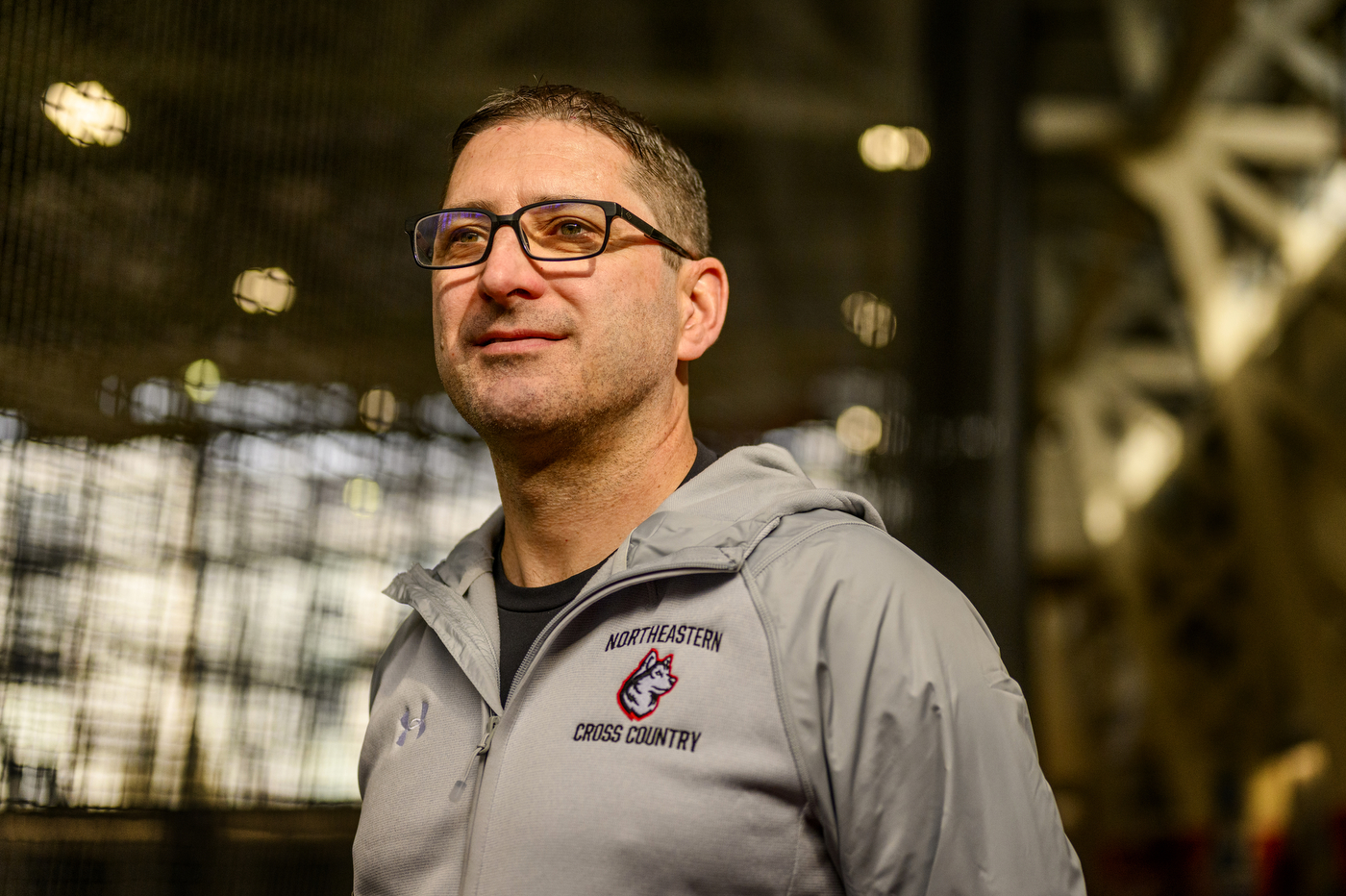
While Duggan and Dickson took different paths to Orlando, they shared a common denominator in Matt Lonergan, the associate head coach of cross country and assistant coach of track and field at Northeastern. His technical advice was drawn from a larger philosophy of living and thriving in the moment without worrying how it would all turn out — true to the spirit of their sport.
“It’s one of those things where, just because you set the goal, that doesn’t mean you really believe it,” Duggan said. “Until you actually achieve it.”
The journey of Michael Duggan
Duggan could do the math as he rounded the final turn at the California International Marathon in December in Sacramento, California. The finish-line clock read 2 hours, 17 minutes, 45 seconds, leaving him a shrinking window of 15 seconds to earn a place at the Olympic Trials … 14 seconds … 13 …
Hours after that race Lonergan would be smiling as he watched a video of Duggan sprinting to the finish.
“He never quite found his spot here,” Lonergan said of Duggan’s career at Northeastern. “He came in to be a distance runner, and then he got corralled into the middle-distance group — the 800 meters, the mile — and he kind of went back and forth between the middle-distance group and the 5,000 or 10,000 meters. We knew he had this potential and he showed glimpses of it, but he never quite found his event.”
“It’s not really anybody’s fault,” Duggan said. Instead of dissecting the past, he focused on exploring his unrealized potential after he moved on from Northeastern. And so his relationship with Lonergan continued.
“I asked him how I should train for the marathon,” Duggan said. “He gave me a rough outline of how to do it and how it was quite different than training for something on the track or cross country. That was a really valuable thing to learn and I don’t think I would have learned that if I wasn’t connected to him.”
It’s one of those things where, just because you set the goal, that doesn’t mean you really believe it. Until you actually achieve it.
Michael Duggan, former Northeastern track athlete and marathoner
Before joining the Northeastern staff in 2013, Lonergan had famously coached his wife, the distance runner Marla Runyan, a three-time U.S. champion in the women’s 5,000 meters. She became the first legally blind athlete to compete in an Olympics in 2000 when she finished eighth in the 1,500 meters at the Sydney Games. In 2006, one year after giving birth to their first child, Anna Lee, she won the USA Marathon Championship, earning Runyan the U.S. Runner of the Year award for a second time.
His access to Lonergan offered a kind of lifelong learning opportunity for Duggan, an accounting and finance graduate of Northeastern who works in Austin, Texas, as a treasury analyst for SunPower, a solar energy company. Following Lonergan’s advice, Duggan extended his love of running along a new path as he made his marathon debut in 2019 with several former Husky teammates at a race in Vermont. On that day his goal was to earn a qualifying time for the Boston Marathon, which in turn opened another door.
There are six World Marathon Majors. Duggan and his former Northeastern teammates James Garbier and Daniel Condon have run three of them together — Boston, Chicago and Berlin.
“We’re trying to complete all six,” said Duggan, which means the Northeastern trio will be making plans to compete in New York, London and Tokyo.
The higher goal of earning a place in the Olympic Trials became realistic when Duggan moved to Austin in 2021 and joined Bat City Track Club, where he found a group of like-minded runners and received personalized coaching from club leader Jeff Cunningham. Inspired by the improvement in his marathon times — from 2:42 in his debut to 2:21 just two years later in Chicago — he was running 80 miles a week with the target of shaving another four minutes off his time last September in Berlin.
“Unfortunately, I had set myself up for failure by underestimating the effect of jet lag,” said Duggan, who had arrived in Germany 48 hours before he ran a disappointing 2:24.
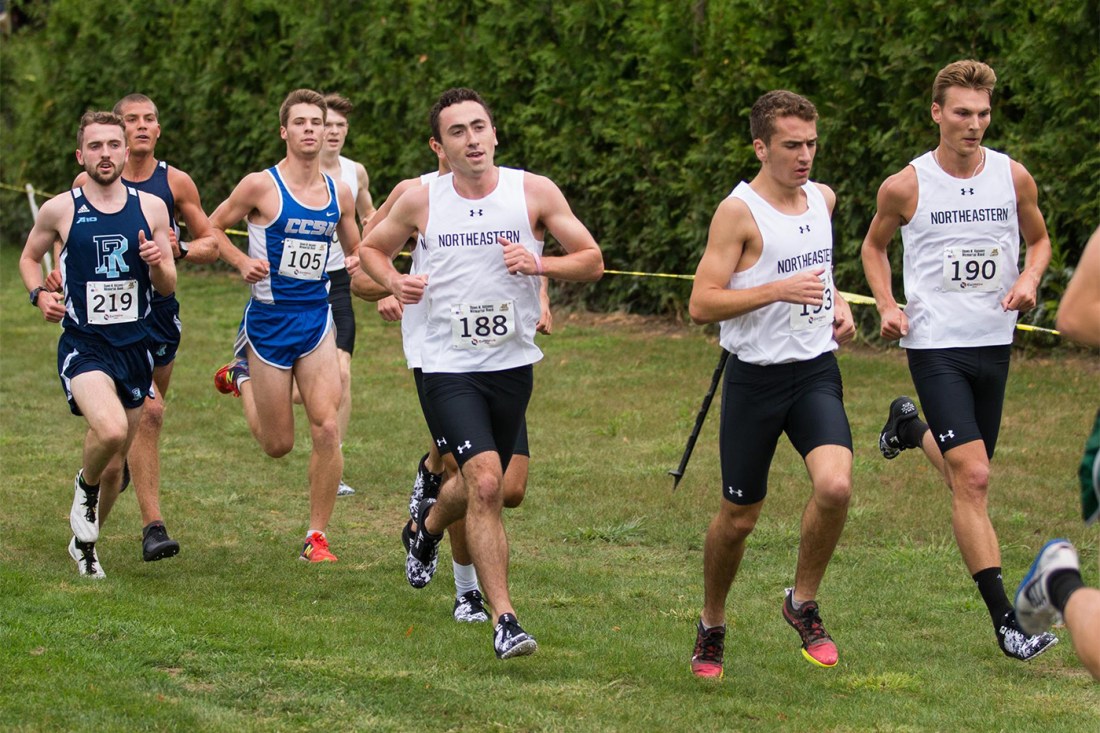
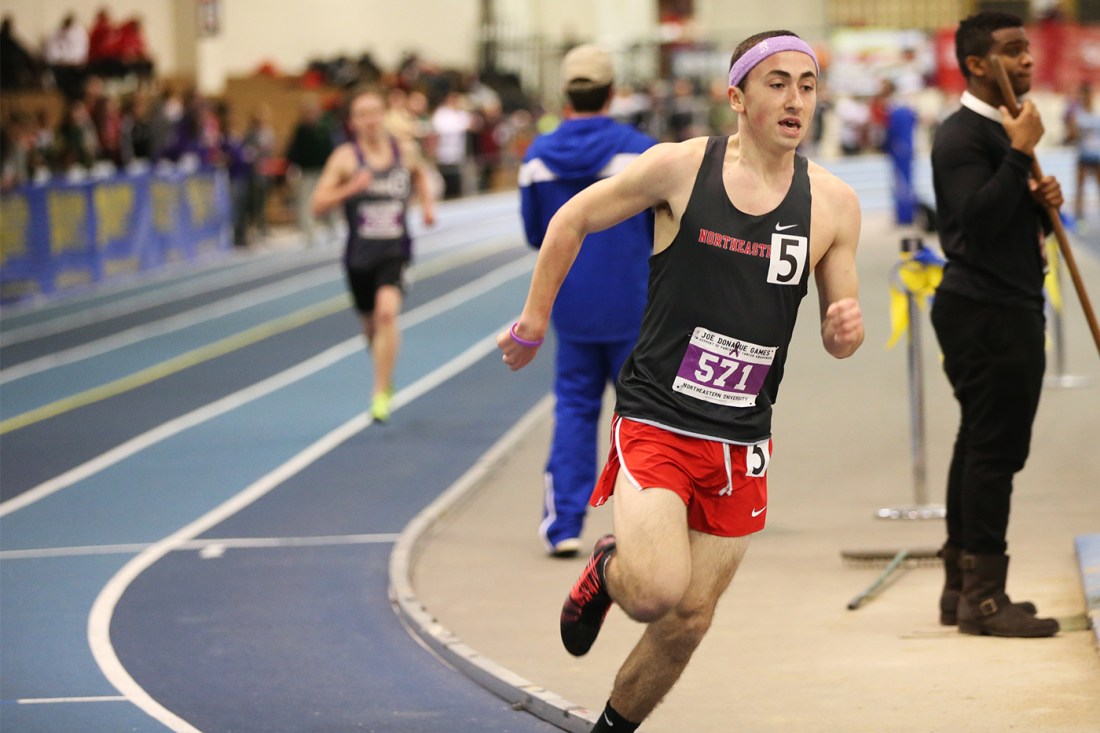
Duggan decided to make one last try at earning a place in Orlando. He was several miles into the race at Sacramento on Dec. 8 when he noticed two competitors up ahead wearing bibs that read OTQ PACE. He realized they were serving as pace-setters for runners who were aiming for the Olympic Trials Qualifying time of 2 hours 18 minutes. Runners like Duggan.
“I found them by accident,” Duggan said. “I didn’t know they were there. I saw the back of the guy had one of those paper bibs. It was just sheer coincidence.”
Duggan had been planning to track his pace with a GPS watch, which can be mentally exhausting.
“You start slipping away from the pace and in your head you start a negative feedback, like, ‘Oh no, I’m slipping,’” Duggan said. “But because I had those two guys, I just turned my mind off. Just run behind these guys. Don’t let them go. Don’t think about it.”
There was no thinking when he rounded the final turn and saw the clock waving at him to hurry along. As the crowd screamed and a fellow runner at the finish line waved a towel like a matador to the bull, Duggan crossed in 2:17:59. He had earned his place at the trials with one second to spare.
“It was just so great to see, especially in such dramatic fashion,” Lonergan said. “A lot of times the people that end up doing really well in the marathon are those individuals in college who are the true distance runners — they’ve trained for the 10,000 meters, they have a lot of mileage and training in the longer workouts and so the jump to the marathon is not as significant.
“But Mike didn’t have that pathway. The jump he made in California at 2:17 was by far the best performance he’s ever had at any distance. Even I was surprised by that.”
Featured Posts
The journey of Cameron Dickson
Dickson had the more fulfilling career as a distance runner at Northeastern. It came as a surprise to the myriad Division 1 coaches who declined to offer him a place on their teams, based on his times in Londonderry, New Hampshire.
He said Lonergan was the one coach who recognized his promise in spite of the slow, hilly terrain of the cross-country courses Dickson raced in high school.
At Northeastern, Dickson suffered a foot stress fracture that essentially sidelined him for his first two years. By his final outdoor season the late bloomer was running 10,000 meters in 29 minutes, 24.94 seconds — a time that still ranks No. 2 at Northeastern — which qualified him for NCAA East Regional. Where, sadly, he suffered another stress fracture.
“I took a long, long time to recover from it to make sure anything I had been nursing or running through in college was going to be long gone,” said Dickson, who graduated in 2021 with bachelor’s and master’s degrees in mechanical engineering. “Then I decided to start all over again.”
He worked with Lonergan on an extensive plan to train for marathons. It included advice on hydration, nutrition, running goals — and no tricks, said Dickson, who credited Lonergan with a straightforward and transparent approach.
“It’s up to you to go further, to go faster, when everything’s feeling really good,” Dickson said. “So both in racing and in training, it comes very slowly. And then it all happens at once.”
The daily training runs offered him a new level of independence. He could feel himself learning and growing as a runner, and he didn’t take that fulfillment for granted after so many injuries that had prevented him from doing what he loved.
“Just the ability to throw a pair of shoes on and go out the door,” said Dickson, who doesn’t take his phone or listen to music when he runs. “It’s just either the quiet or the early 7 a.m. hum of the city of Boston. It isn’t a super romantic way to put it for people who don’t run, but it’s just tap-tap-tap along the Charles River or around a neighborhood park, and it’s beautiful and really calming and centering to have that time alone.
“So it’s not just about learning about yourself as an athlete. It’s about working through a lot of the other intricacies of life within that hour or two that you have to yourself.”
He had only 12 weeks to prepare for his debut at the Chicago Marathon last October, which Lonergan helped him enter based on Dickson’s times in half-marathon and 20-kilometer races. “We were expecting a lot of random things to go poorly,” Dickson said.
His calves felt on the verge of cramping over the last quarter of the race. But as Dickson approached the final mile with a buffer of more than 30 seconds he knew he was going to get through. In his first marathon he finished 28th in a world-class field and qualified for the U.S. Olympic Trials with a time of 2:17:15.
“It does only boil down to two seconds per mile,” Dickson said. “It’s pretty darn difficult especially if you’re considering how much training and how many marathons it took Mike Duggan — as compared to me, who got a little lucky. As coach Lonergan said to me, ‘Usually something goes wrong.’ And it was a little bit of a miracle that nothing huge went wrong.”
Duggan understood how much went into each moment of success.
“Running is a very individualized thing because you cross the starting line and the finish line alone, but there are a lot of people along the way,” said Duggan, and among those supporters he named his adviser from Northeastern. “I’m grateful for the coaches like Matt Lonergan, who was helpful in college and then in helping me out on how to train after college.”
Dickson felt the same way. As he spoke of the coaches and teammates who had influenced him and the life lessons he had learned along the way, it was as though he was looking back on his running career as one long continuous race of ups and downs and checkpoints that are ongoing. There are many more miles ahead, and maybe it’s the strength of his sport’s loneliness that he never feels alone.
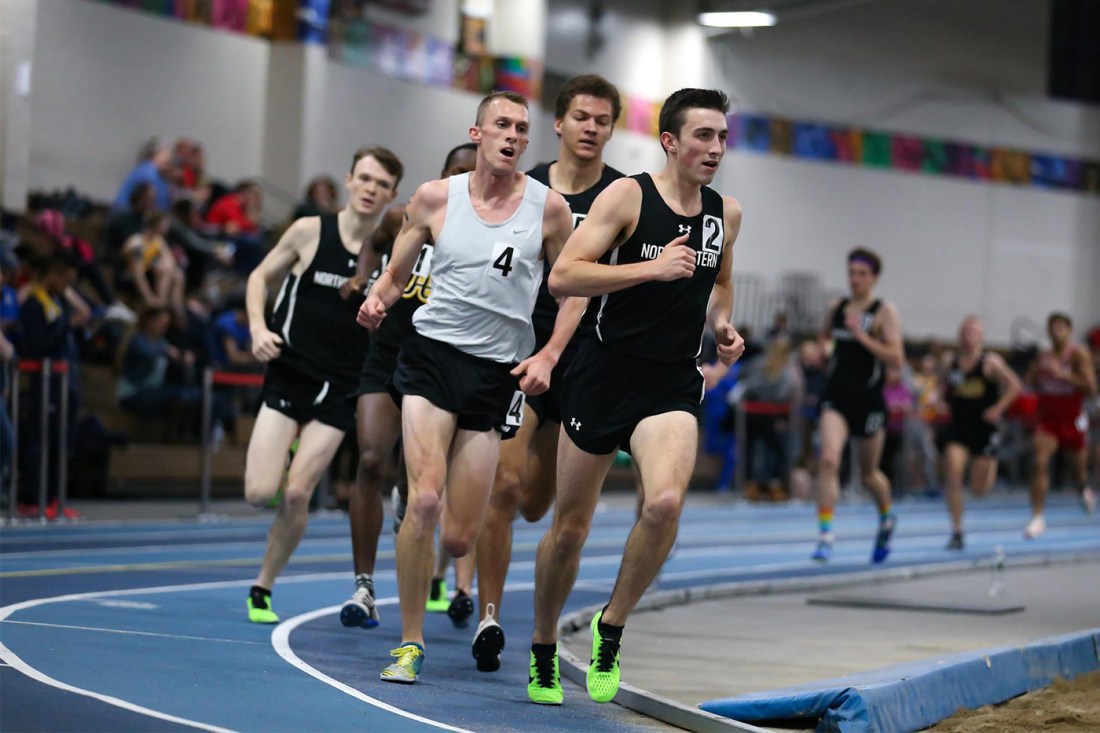
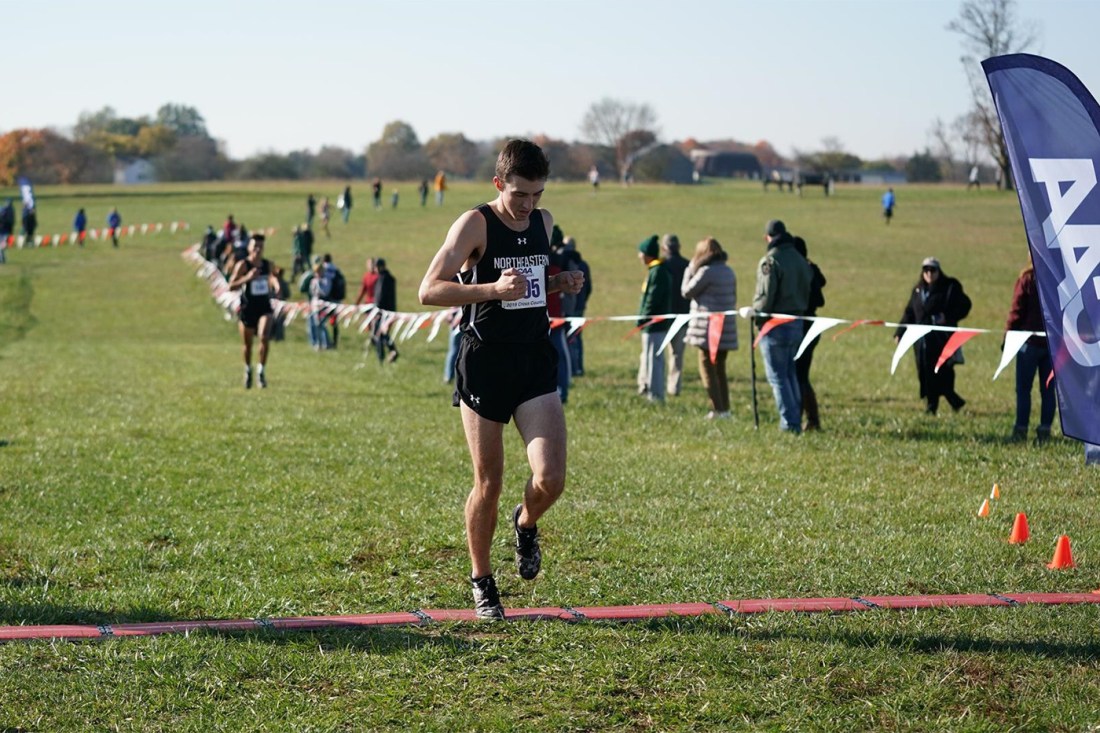
Six weeks before Dickson’s breakthrough marathon in Chicago, something happened that affirmed and transcended the relationship with his coach. Lonergan was cycling to Northeastern at 5:30 a.m. on Aug. 29 when he was hit by a truck. He woke up in the hospital.
“I broke both arms and fractured my patella,” Lonergan said. “I had surgery on all three limbs. I spent over a week in the hospital and had a clot in my lung and clots in my leg. I had bruised ribs and lungs. I was out for a while.”
He needed someone to fill in at Northeastern while he recovered. He turned to Dickson, who was flattered to be asked.
“I couldn’t believe it happened,” Dickson said. “I felt absolutely terrible for him.”
By providing support for his friend during the cross country season, Dickson gained a new perspective on how he and other runners are enabled by the best coaches.
“It was really interesting to be on the other side of the rope, watching people instead of doing it yourself,” said Dickson, who was able to provide coaching around his new job in Boston as a mechanical engineer with Amazon Fulfillment Technologies and Robotics. “It’s incredibly challenging, and there’s a lot more nuance in the day-to-day and how you interact with the athletes than you would ever expect.”
The 200 American men who lined up for the U.S. Olympic Trials on Feb. 3 represented several tiers. Some were established professional runners. Others were trying to transform their love for running into a full-time career. Then there were the likes of Dickson and Duggan, who fit their training runs around the 40-hour work week.
It was a warm day in Orlando, rising into the 70s, and the heat was hard on the runners with 50 failing to complete the race. Duggan — though he had qualified just two months earlier — finished 57th in 2:20:03, almost 11 minutes behind the winner. Dickson, in his second career marathon, was 135th in 2:29:30.
Lonergan, mostly recovered from his injuries, was watching from his home in Boston.
“We who are in the sport, we know there’s always another level,” Lonergan said. One level is measured in distance, he was saying. Another is measured by depth.
Ian Thomsen is a Northeastern Global News features writer. Email him at i.thomsen@northeastern.edu. Follow him on X/Twitter @IanatNU.







